Clocking in at 105 minutes, Twilight of the Cockroach’s Roger Rabbit-like mix of anime and live action is hardly a fun, quirky movie about adorable anthropomophized cockroaches. In fact, it’s hard to tell what the movie is trying to say.
Naomi and Ichiro live in a roach’s Eden. Their society shares an apartment with an absolute slob of a human. Whenever he eats, there’s always a ton of leftovers and he doesn’t care too much if the roaches literally have a party in front of him.
It all seems so blissful that even Naomi and Ichiro are about to get married any day now… until the human gets a girlfriend and we all know women are neat freaks. After an unprovoked attack on roach-kind, on the fated wedding day no less, the roaches continue to let their guards down, resulting in a follow-up attack that leaves much of “roachdom” devastated.
While the youthful roaches suffer trying to cope with this harsh, new world, the elder roaches hardly blink, one of them brags, “It was always like this when I was just a hatchling. Doesn’t frighten me one bit. Scrambling for food and water is good for ya–it builds character.” His buddy adds, “I couldn’t agree more.” The movie might seem a little depressing if it was anything but dirty cockroaches being killed. Even with a human face, I find it difficult to sympathize with cockroaches. Being so long in length, the movie has some odd and, quite frankly, unnecessary moments. For instance, the strangely voyeuristic scene of the human female stripping down to her undergarments:
Why this scene was included in a movie about roaches and their survival is beyond me. The movie, however, reaches levels of ridiculousness for other reasons entirely, especially when one considers that it is supposed to be an allegory of modern day Japan, an allegory that the director himself admits:
Yoshida has said that “Twilight” is about Japan, that the concept of a “hated” species is not unlike the racial and cultural enmity with which Japan is perceived. With that in mind, “Twilight” itself becomes richer, and somewhat troubling. It’s all there to dig out: militarism, purity of the species, survival of the fittest, genetic adaptation, cultural accommodation, social conformity, moral repression, and even the generation gap. Later, just to unsettle things even more, the idea that “we cockroaches will prevail” and “God chose the roach to inherit the earth” is offered several times. — Richard Harrington, Washington Post (source)
Let’s expand on a few of the points supplied by Harrington.
TotC pines for the old days of masculinity when men were warriors, but a little more backstory before I explain what I mean by this. A romantic subplot runs parallel with the main story of roach destruction. Early in the film, Hans, a roach from a less fortunate society, crawls his way to Naomi’s Eden. He’s absolutely unlike Ichiro in every way: tall (if a roach could stand on two feet), broad-shouldered, square-jawed and clearly a man of few words.
While Ichiro is busying himself with games and mirthfulness like playing tennis,
the taciturn Hans has only one thing in mind: his duty to his “country.” Y’see, where he’s from, the roaches are in constant warfare with humans. Unsurprisingly, Naomi falls out of love with pansy modern man Ichiro and chases after the hunky Hans, resulting in a silly montage of her crossing the perilous outside world of grass and talking shit. Yes, you heard right, talking shit.
It’s not hard to connect the dots: the movie mocks contemporary Japanese men in Ichiro’s portrayal while upholding Hans’ traditional definition of manliness. Naomi eventually finds her way back to her home to encounter Ichiro rushing to embrace her. He sheds tears as he proclaims how much he missed her, but she stares off into the distance, cold to his emotional (un-manly) display.
No doubt she’s already missing the hunky Hans. TotC finds something noble in Hans. After all, he’s a loyal warrior, but not only that, he willingly (and foolishly) volunteers to lead the next attack on the human female even if it would guarantee his death. Naomi lovingly recounts, “Each night when he returned to me, he’d whisper, ‘I’m alive… I’m still alive.'” Hans’ life somehow means more than Ichiro’s, a glorification of war and its “heroes.”
The allusions to WW2 Germany are quite apparent throughout TotC even down to Hans’ name, a common German short-hand for Johannes. Not only that, Hans’ leader eerily resembles a certain fuhrer though not in looks but in speech (his underlings at one point salute him by “Long live the enforcer!”).
The leader of this roach society stands before a crowd and drives them to feverish pitches with his propaganda.
He’s all over the place, talking about persecution to genocide. At one point, he proclaims: “…we are proud of the purity of our species.” It’s hard not to see this as a conservative Japanese message, especially owing to the fact that Japan has one of the most homogenous populations in the world. Still, we have Naomi from a Japanese-esque roach society hooking up with Hans of a Spartan-like, WWII German-esque society. As a result, the messages of racial impurity are murky at best. The leader continues, ranting on about being God’s chosen species (“God chose the roach to inherit the world.”) and how roachkind will eventually prevail in the end, disturbing echoes of Japan’s imperialistic days.
The allegory falls apart when the same guy starts proclaiming that humans don’t understand roaches and that roaches have never hurt anybody. This is where one starts to wonder if Director Yoshida is supporting or condemning the views within the movie. If this is a story about Japan, it’s a delusional thing to say. After all, is Japan really misunderstood?
Has Japan really hurt nobody? When you consider the conservative ideals of Japanese war hawks and their revisionist approach to the events of WW2, however, it’s not that unbelievable that some people actually do believe Japan has done no wrong.
It becomes hard to tell whether or not this is an indictment against conservatism or not. Just when the conservative message of the movie starts to escalate toward absurdity, when one suspects that the movie can’t be serious, the film backpedals to deliver another conservative message.
When the extermination of the roaches finally occur in the latter half of the film, the elder roaches annoyingly remark in their “I told you so” manner, “They’ve been killing us like flies since before my grandfather was born.” Since the start of the movie, the elders have been admonishing the young roaches for living too freely and out in the open. It’s just not what roaches do, apparently. You can easily draw parallels from the roaches to Japan’s Westernization and self-perceived moral decadence. You can imagine the older, more conservative Japanese shaking their heads at today’s youth.
This peculiar shot of roaches sleeping freely on panties epitomizes the movie’s message that the roaches (Japanese) have submerged themselves far too deep into the lives of humans (Western culture). At one point, a roach complains about the government imposed curfew: “You’re violating our civil rights!” What shortly follows is a guard roach being lured away from his post by a flirty group of giggling girls. The next day, they are attacked again, implying a couple of disturbing underlying messages: civil rights should come second to safety and we must remain forever vigilant, ready for battle. Considering Japan’s lack of a military, it’s hard not to see TotC as a war hawk’s dream movie.
And yet the movie double panders. Naomi recounts a nightmare of complete desolation, a world where all but Naomi and Ichiro have died. This is obvious foreshadowing, but it’s also exploitative by striking chords of a certain tragic event in Japan’s history. This fearmongering simultaneously argues for both the necessity of war and the conceit that the roaches (Japanese people) are victims.
To top it all off, the movie returns to farce. The comic end of both “the enforcer” and Hans had me laughing out loud and from the picture shown below, that must have been the intended result.
I rolled my eyes too at Ichiro’s demise. From one viewpoint, the warmongering led to a disasterous “total war” that culminated in the roaches’ utter defeat. The ending sequence, however, plays out with such little irony, sending conflicting messages again. After committing “genocide,” the humans are shown as savage beasts feasting like (Western?) pigs,
while a final message for Naomi proclaims that all is for the best: the escalation to chemical warfare (nuclear weapons?) means survival of only the fittest. So what’s the verdict? I’m afraid Yoshida has crafted a movie that be interpreted equally as both a supporter and indictment of conservatism. The conservatism is blatant at times while one has to dig for the underlying irony. As a result, I can only imagine that it depends ultimately on the viewers as to what TotC is trying to say.


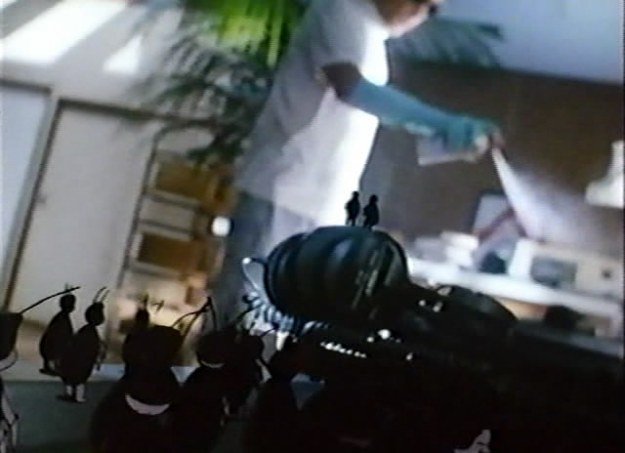

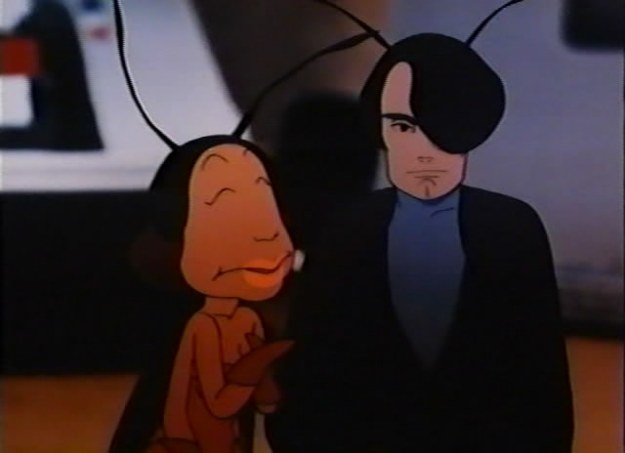
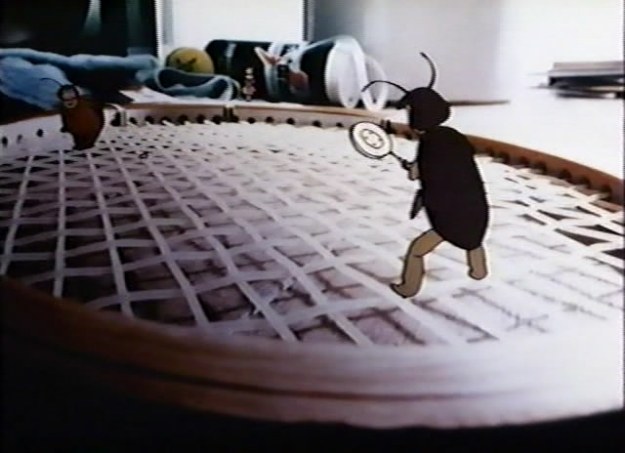







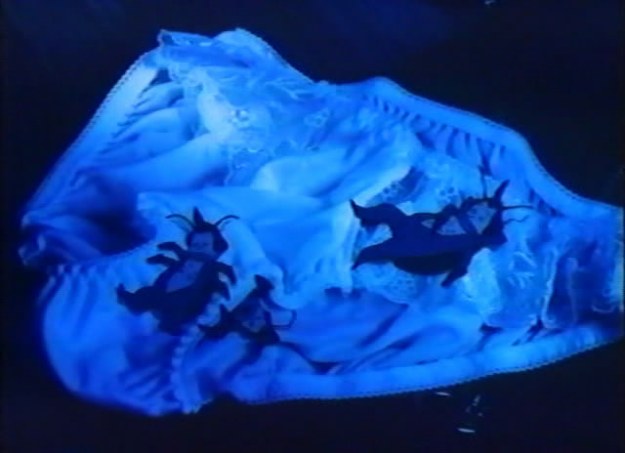
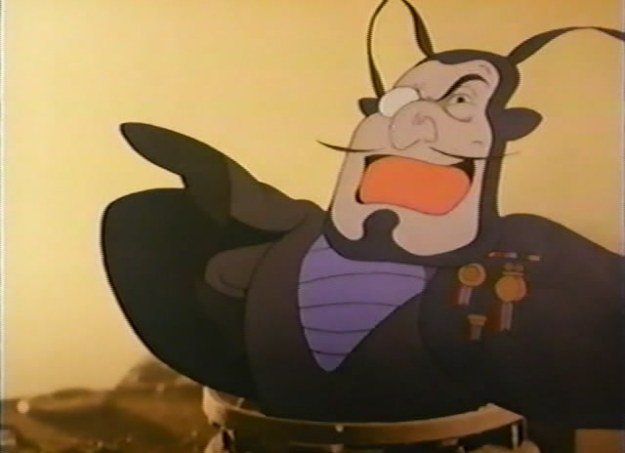


I suppose if anything, this shows how difficult it is to objectively examine one’s own culture. Reminds me a little bit of how great Team America: World Police sounded in theory, as opposed to how it was carried out in reality.